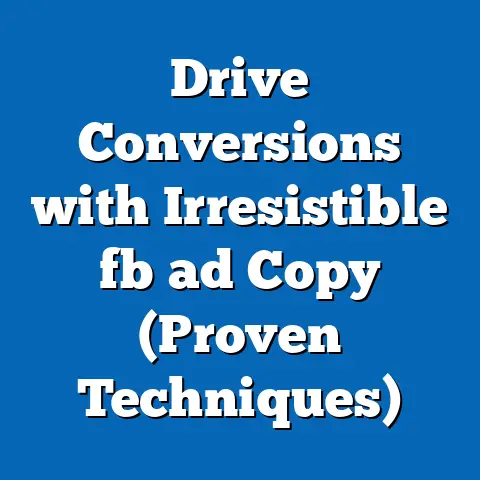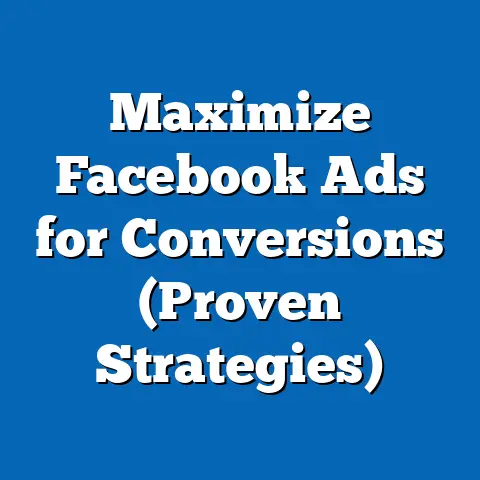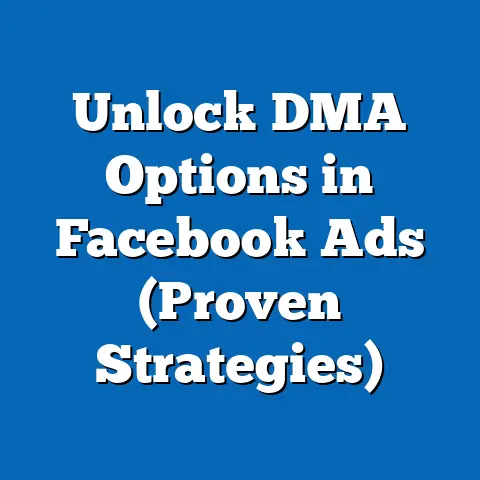Master Facebook Ad Disputes (Proven Resolution Strategies)
Did you know that over 50% of Facebook ad accounts experience at least one dispute throughout their lifetime?
It’s a jarring statistic, I know.
I’ve personally been there, sweating over a suspended ad account and the potential loss of revenue.
These disputes can lead to significant financial setbacks and damage your brand’s reputation.
Facebook advertising is a cornerstone of modern digital marketing, but its effectiveness can be severely hampered by disputes.
That’s why understanding and mastering dispute resolution strategies is crucial for maintaining successful advertising on the platform.
In this guide, I’ll walk you through everything you need to know to navigate the often-turbulent waters of Facebook ad disputes.
From understanding the common reasons for disputes to implementing proactive measures, and from crafting a compelling appeal to learning from past mistakes, I’ll equip you with the knowledge and tools to keep your campaigns running smoothly and your business thriving.
Let’s dive in!
Understanding Facebook Ad Disputes
A Facebook ad dispute is essentially a disagreement or challenge to an advertisement or ad account that violates Facebook’s advertising policies or terms of service.
These disputes can arise from various sources, including Facebook’s automated systems, user reports, or even intellectual property claims.
Common scenarios leading to disputes include:
- Ad Rejection: Facebook disapproves an ad before it even runs.
- Account Suspension: Facebook temporarily or permanently disables an ad account.
- Policy Violations: Ads found to be in breach of Facebook’s advertising policies.
- Intellectual Property Infringement: Claims of copyright or trademark violations.
The implications of these disputes on businesses can be substantial.
Besides the immediate financial losses from ads being taken down and the disruption to marketing strategies, there’s also the potential damage to brand reputation.
A suspended ad account can halt lead generation, reduce website traffic, and ultimately impact sales.
According to recent industry reports, ad disputes cost businesses millions of dollars annually.
This is due to wasted ad spend, lost opportunities, and the resources required to resolve the issues.
From my own experience, I know how frustrating it is to see a perfectly crafted campaign grind to a halt because of a seemingly arbitrary policy violation.
Key Takeaway: Understanding what constitutes a Facebook ad dispute and its potential impact on your business is the first step in developing a robust resolution strategy.
Common Reasons for Ad Disputes
While Facebook’s advertising policies are designed to protect users and maintain a positive platform experience, they can sometimes feel opaque and confusing.
Here’s a breakdown of the most prevalent causes of ad disputes:
Violations of Facebook’s Advertising Policies
This is the most common culprit.
Facebook has a comprehensive set of advertising policies covering a wide range of topics, including prohibited content, restricted content, and ad formatting requirements.
Examples of policy violations include:
- Misleading or Deceptive Content: Ads making false claims or exaggerating product benefits.
- Discriminatory Practices: Ads targeting or excluding specific demographics based on protected characteristics (e.g., race, religion, gender).
- Sensational or Shocking Content: Ads containing graphic violence, nudity, or other offensive material.
- Personal Attributes: Ads that directly reference a person’s attributes (e.g., “Are you struggling with debt?”).
- Health and Medical Claims: Ads making unsubstantiated claims about health benefits or cures.
I once ran an ad for a weight loss product that was immediately flagged for violating Facebook’s health and medical claims policy.
Even though I believed the claims were legitimate, Facebook’s interpretation was stricter than I anticipated.
It taught me a valuable lesson about thoroughly vetting every aspect of an ad against Facebook’s policies.
Infringement of Intellectual Property Rights
Facebook takes intellectual property rights very seriously.
If your ad contains copyrighted material (e.g., images, music, videos) or trademarks without proper authorization, you could face a dispute.
Examples of intellectual property infringement include:
- Using copyrighted images or videos without permission.
- Using a trademarked logo or brand name without authorization.
- Selling counterfeit products or services.
I had a client who unknowingly used an image in their ad that was copyrighted.
The photographer filed a complaint, and Facebook promptly took down the ad.
We had to scramble to find a suitable replacement image and ensure we had the necessary usage rights.
Misleading or False Claims in Ad Content
Even if your ad doesn’t explicitly violate any specific policy, it can still be flagged for making misleading or false claims.
This includes exaggerating product benefits, making unrealistic promises, or using deceptive marketing tactics.
Examples of misleading or false claims include:
- Promising unrealistic results (e.g., “Get rich quick!”).
- Using fake testimonials or endorsements.
- Misrepresenting the features or benefits of a product or service.
Targeting Inappropriate Audiences
Facebook’s targeting options are powerful, but they can also be misused.
Targeting ads to audiences that are too young, vulnerable, or susceptible to exploitation can lead to disputes.
Examples of targeting inappropriate audiences include:
- Targeting ads for alcohol or gambling to underage users.
- Targeting ads for financial services to individuals in financial distress.
- Targeting ads for weight loss products to individuals with eating disorders.
Key Takeaway: Understanding these common reasons for ad disputes is crucial for preventing them in the first place.
By carefully reviewing your ad content, targeting options, and compliance with Facebook’s policies, you can significantly reduce your risk of facing a dispute.
Proactive Measures to Prevent Disputes
Prevention is always better than cure.
By taking proactive measures to ensure your ads comply with Facebook’s policies, you can significantly reduce your risk of facing a dispute and avoid the associated headaches.
Understanding Facebook’s Advertising Guidelines and Policies
This is the most fundamental step.
You need to be intimately familiar with Facebook’s advertising policies, which are regularly updated.
Make it a habit to review these policies periodically to stay informed of any changes.
Here are some key areas to focus on:
- Prohibited Content: Understand what types of content are strictly prohibited on Facebook (e.g., hate speech, violence, illegal activities).
- Restricted Content: Be aware of content that requires special authorization or is subject to specific restrictions (e.g., alcohol, gambling, financial services).
- Ad Formatting Requirements: Ensure your ads meet Facebook’s technical specifications and formatting guidelines (e.g., image size, video length, headline character limits).
Facebook’s Business Help Center is your best friend here.
It contains a wealth of information on advertising policies, guidelines, and best practices.
Tips for Creating Clear, Honest, and Engaging Ad Content
Transparency and authenticity are key.
Avoid making exaggerated claims or using deceptive marketing tactics.
Instead, focus on highlighting the genuine benefits of your product or service in a clear and concise manner.
Here are some tips for creating compliant ad content:
- Be Honest and Transparent: Don’t make claims that you can’t back up with evidence.
- Focus on Benefits, Not Just Features: Explain how your product or service solves a problem or improves the user’s life.
- Use Clear and Concise Language: Avoid jargon or technical terms that your audience may not understand.
- Proofread Carefully: Ensure your ad copy is free of grammatical errors and typos.
Strategies for Choosing Appropriate Images and Videos that Align with Policies
Visuals are powerful, but they can also be a source of policy violations.
Choose images and videos that are relevant, high-quality, and compliant with Facebook’s guidelines.
Here are some tips for selecting appropriate visuals:
- Avoid Sexually Suggestive or Explicit Content: Facebook has strict rules against nudity and sexually suggestive content.
- Ensure You Have the Rights to Use the Images and Videos: Don’t use copyrighted material without permission.
- Choose Images and Videos that are Relevant to Your Ad: The visuals should accurately represent your product or service.
- Use High-Quality Images and Videos: Blurry or pixelated visuals can detract from your ad’s credibility.
Highlight the Importance of Audience Targeting and How Missteps Can Lead to Disputes
Precise targeting is crucial for reaching the right audience and avoiding disputes.
Ensure your targeting options align with Facebook’s policies and don’t discriminate against any protected groups.
Here are some tips for responsible audience targeting:
- Avoid Targeting or Excluding Specific Demographics Based on Protected Characteristics: Don’t target or exclude users based on race, religion, gender, age, or other protected characteristics.
- Be Mindful of Sensitive Topics: Avoid targeting ads related to sensitive topics (e.g., health, finances) to vulnerable audiences.
- Use Custom Audiences Responsibly: Ensure you have obtained consent from users before adding them to custom audiences.
Key Takeaway: By implementing these proactive measures, you can significantly reduce your risk of facing a Facebook ad dispute and ensure your campaigns run smoothly.
Step-by-Step Guide to Navigating Ad Disputes
Even with the best preventative measures, ad disputes can still happen.
When they do, it’s essential to have a clear and structured approach to resolving them quickly and effectively.
Here’s a step-by-step guide:
1. Identifying the Problem: How to Diagnose the Specific Issue Leading to the Dispute
The first step is to understand why your ad was flagged.
Facebook usually provides a reason for the disapproval or suspension, but it can sometimes be vague.
- Check the Ad Manager: Look for notifications or alerts in your Facebook Ads Manager.
- Read the Policy Violation Notice: Carefully read the policy violation notice to understand which specific policy you allegedly violated.
- Analyze Your Ad Content and Targeting: Review your ad copy, images/videos, and targeting options to identify potential issues.
2.
Gathering Evidence: What Documentation and Information to Compile (e.g., Screenshots, Ad Copies, Policy References)
Once you’ve identified the potential issue, gather evidence to support your case.
This may include:
- Screenshots of Your Ad: Capture screenshots of your ad as it appears on Facebook, including the ad copy, visuals, and targeting options.
- Ad Copies: Save copies of your ad copy and any relevant landing page content.
- Policy References: Cite specific sections of Facebook’s advertising policies that you believe support your case.
- Supporting Documentation: If your ad involves a product or service that requires authorization, gather any relevant licenses or permits.
3.
Submitting an Appeal: Detail the Procedure for Submitting an Appeal to Facebook, Including Tips for Writing a Compelling Appeal Letter
Once you’ve gathered your evidence, it’s time to submit an appeal to Facebook.
- Navigate to the Ad Manager: Go to your Facebook Ads Manager and locate the disapproved ad or suspended account.
- Click the “Appeal” Button: Look for an “Appeal” or “Request Review” button and click it.
- Write a Compelling Appeal Letter: This is your opportunity to explain why you believe the dispute is unwarranted and provide evidence to support your case.
Tips for writing a compelling appeal letter:
- Be Polite and Professional: Maintain a respectful tone throughout your appeal.
- Clearly State Your Case: Explain why you believe the dispute is unjustified and provide specific reasons.
- Provide Evidence: Include all relevant evidence to support your case, such as screenshots, ad copies, and policy references.
- Acknowledge the Policy Violation (If Applicable): If you inadvertently violated a policy, acknowledge the mistake and explain how you will prevent it from happening again.
- Request a Review: Politely request that Facebook review your appeal and reinstate your ad or account.
4.
Utilizing Facebook Support: How to Effectively Communicate with Facebook’s Support Team, Including Best Practices for Responses and Follow-Ups
If your appeal is rejected or you need further assistance, you can try contacting Facebook’s support team.
- Use the Facebook Business Help Center: The Facebook Business Help Center offers various support options, including live chat, email support, and phone support (depending on your ad spend).
- Be Patient and Persistent: Facebook’s support team can be overwhelmed with requests, so be patient and persistent in your follow-ups.
- Provide Detailed Information: When contacting support, provide as much detail as possible about your issue, including your ad account ID, ad ID, and any relevant screenshots or documentation.
- Be Polite and Respectful: Remember that you’re interacting with a human being, so be polite and respectful in your communications.
5.
Monitoring the Outcome: What to Do After Submitting an Appeal and How to Handle Various Outcomes (Approval vs.
Rejection)
After submitting your appeal, monitor the outcome closely.
- Check Your Ad Manager Regularly: Check your Facebook Ads Manager regularly for updates on your appeal.
- Respond to Facebook’s Requests: If Facebook requests additional information or clarification, respond promptly and provide the requested details.
- Handle Approval: If your appeal is approved, congratulations!
Monitor your ad’s performance and ensure it continues to comply with Facebook’s policies. - Handle Rejection: If your appeal is rejected, don’t give up.
Review Facebook’s feedback carefully, identify the areas where you fell short, and revise your ad accordingly.
You can also consider submitting a new appeal with additional evidence or clarification.
Key Takeaway: By following this step-by-step guide, you can effectively navigate Facebook ad disputes and increase your chances of a successful resolution.
Proven Strategies for Successful Resolutions
While the above steps are crucial, some additional strategies can significantly improve your chances of a successful dispute resolution.
Leveraging Community Support or Professional Networks for Advice
Don’t underestimate the power of community knowledge.
Facebook advertising is a complex field, and other marketers may have encountered similar disputes and found effective solutions.
- Join Facebook Advertising Groups: There are numerous Facebook groups dedicated to Facebook advertising.
These groups can be a valuable source of advice, support, and best practices. - Connect with Other Marketers: Reach out to other marketers in your network and ask for their insights.
- Seek Professional Advice: Consider consulting with a Facebook advertising expert or agency for professional guidance.
I’ve personally found Facebook advertising groups to be incredibly helpful.
I’ve learned about new policies, discovered hidden features, and received valuable advice on resolving disputes.
Using Third-Party Mediation Services if Applicable
In some cases, you may consider using third-party mediation services to help resolve your dispute.
These services can act as a neutral intermediary between you and Facebook, facilitating communication and helping to find a mutually agreeable solution.
- Research Reputable Mediation Services: Look for mediation services that specialize in Facebook advertising disputes and have a proven track record of success.
- Understand the Costs and Benefits: Be aware of the costs associated with mediation services and weigh them against the potential benefits.
- Be Prepared to Compromise: Mediation involves finding a compromise that works for both parties.
Be prepared to make concessions to reach a resolution.
Continuously Educating Oneself on Facebook’s Evolving Policies and Adapting Strategies Accordingly
Facebook’s advertising policies are constantly evolving, so it’s crucial to stay informed of any changes and adapt your strategies accordingly.
- Subscribe to Facebook’s Business Updates: Sign up for Facebook’s business updates to receive notifications about policy changes and new features.
- Follow Industry Blogs and Publications: Stay informed about the latest trends and best practices in Facebook advertising by following reputable industry blogs and publications.
- Attend Webinars and Conferences: Attend webinars and conferences to learn from experts and network with other marketers.
Key Takeaway: By leveraging community support, considering mediation services, and continuously educating yourself on Facebook’s evolving policies, you can significantly increase your chances of a successful dispute resolution.
Learning from Disputes
Every dispute, whether successful or not, provides valuable learning opportunities.
Analyzing the outcomes of your disputes can help you improve your future advertising efforts, enhance compliance, and mitigate risks.
Emphasize the Importance of Analyzing Dispute Outcomes to Improve Future Advertising Efforts
Don’t just resolve the dispute and move on.
Take the time to analyze the root cause of the issue and identify areas where you can improve.
- Review Your Ad Content and Targeting: Carefully review your ad copy, visuals, and targeting options to identify potential areas of concern.
- Identify Policy Violations: Determine which specific policies you violated (if any) and understand why.
- Analyze Facebook’s Feedback: Pay close attention to Facebook’s feedback and use it to guide your future advertising efforts.
Discuss How to Use Insights Gained from Disputes to Refine Ad Strategies, Enhance Compliance, and Mitigate Risks
The insights you gain from disputes can be used to refine your ad strategies, enhance compliance, and mitigate risks.
- Update Your Ad Creation Process: Incorporate the lessons learned from disputes into your ad creation process to ensure future ads comply with Facebook’s policies.
- Develop a Compliance Checklist: Create a checklist of key policy requirements to review before submitting each ad.
- Monitor Your Ads Regularly: Monitor your ads regularly for potential policy violations and address them promptly.
Encourage a Growth Mindset, Viewing Disputes as Learning Opportunities Rather Than Setbacks
Ad disputes can be frustrating, but it’s important to view them as learning opportunities rather than setbacks.
By adopting a growth mindset and embracing challenges, you can become a more effective and resilient Facebook advertiser.
Key Takeaway: By analyzing dispute outcomes, refining your ad strategies, and adopting a growth mindset, you can turn ad disputes into valuable learning opportunities and improve your overall Facebook advertising performance.
Conclusion
Mastering Facebook ad disputes is not just about resolving individual issues; it’s about building a robust and sustainable advertising strategy.
It requires a proactive approach, a clear understanding of Facebook’s policies, and a willingness to learn from past mistakes.
In this guide, I’ve covered the key strategies for navigating Facebook ad disputes, including:
- Understanding the common reasons for disputes.
- Implementing proactive measures to prevent disputes.
- Following a step-by-step guide to resolving disputes.
- Leveraging community support and other resources.
- Learning from dispute outcomes to improve future advertising efforts.
Now, I encourage you to implement these strategies in your advertising efforts to safeguard your campaigns, maximize your marketing ROI, and achieve your business goals on Facebook.
Don’t let ad disputes hold you back.
Take control of your advertising destiny and become a master of Facebook ad dispute resolution!






